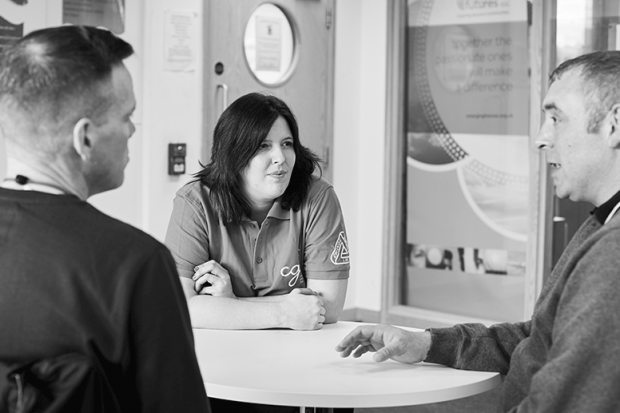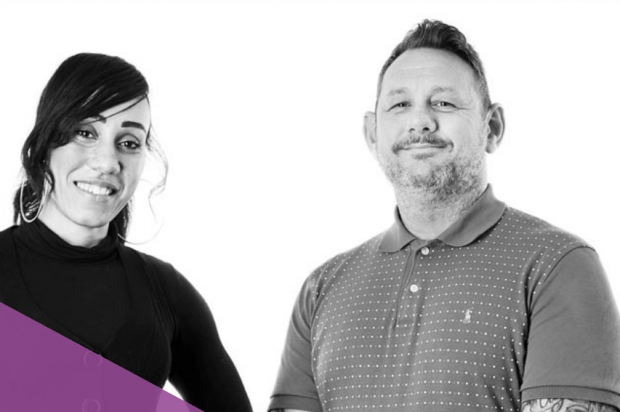
Recently, I met up with Ellie Reed, Principal Social Worker and National Social Work Lead for Change Grow Live, a voluntary sector organisation specialising in substance misuse and criminal justice intervention projects in England, Scotland and Wales.
I wanted to learn more about the way social workers in her organisations are supporting people with drug and alcohol issues. My visit was an ideal opportunity to discover how social work interventions are helping individuals and families lead happier, healthier, more independent lives.
I am so pleased to see Ellie’s organisation positioning social work as a professional service within the broader health and social care system and promoting holistic approaches to meet people’s needs and wants.
The placements offered by Change Grow Live provide fantastic opportunities for students to develop their knowledge and skills around the impact of drug and alcohol misuse on individuals and families.
Not only that, they can see first-hand how social work interventions support people through recovery and help them achieve the positive lifestyles they desire.

Ellie: What is the secret to providing effective student social work placements? That’s a question we have been asking ourselves at Change Grow Live. We are in the business of behaviour change, which means we’re all learning, all the time.
In social work, I’m eager to learn about what works when supporting our future social workers, and how to provide a supportive student placement where learning is maximised. I know I’m not alone in wanting to understand the ingredients of a good placement experience.
Learning is not a solitary exercise
We learn from the people we help, our colleagues and our partners. Reflective practice is at the core of social work and enables us to take our learning to a deeper level. In the full and pressured days of first-line operational social work, it can sometimes be difficult to find the time to stop, reflect, and capture this valuable learning.
Working with people who experience a range of mental and physical health issues linked to problematic drug and alcohol use is a complex, yet hugely rewarding role, one where the skills and knowledge of social workers contribute to enhancing the services we provide.

Through our experience of running sometimes challenging but always rewarding social work placements, we’ve identified the key ingredients that create a successful social worker placement.
Here are some of the things we’ve learned:
Power dynamics and professionalism
We need to be aware of power dynamics from the outset of a placement and support our students to identify and develop their professional confidence if needed.
Some students need support with professional skills and the tone of their communication, even when this as simple as guidance on answering emails or appropriately addressing service users and colleagues.
Tools to help us understand development needs
By completing a quality standards assessment at the beginning of a placement and an evaluation at the end, we have information that can help the way we support future placements. Something as simple as a timeline for students and staff to work from at the beginning can have a huge benefit. Placing students in an office with staff is vital for their learning; we’ve found that boundary setting, reflective discussions and planning can all be facilitated by the observation of other staff.

The four cornerstones of a successful placement
From these findings, we’ve identified four crucial elements that create supportive, challenging and rewarding placements:
-
Get the start right – develop a service specific induction. Make sure the practice educator is in place and set expectations early and explicitly. Use the practice learning agreement as a tool to understand development requirements and establish timelines.
-
Get professional – discuss professional boundaries and expectations, the use of key policies and procedures, privacy, non-disclosure and confidentiality. Discuss values based social work and decision making. Give support, honest feedback and provide learning opportunities.
-
Get technical – data and systems can be daunting. Make sure you are providing all the support needed to start using the relevant systems. Remember, a student needs the confidence to tell you if they do not understand.
-
Get realistic – carry out an interview process and only offer a placement opportunity to a student if you think they are suitable for the role and project. Once your student starts their placement, keep the lines of communication open and honest with universities, practice educators and managers.

By sharing our experiences and learning I hope we might be able to increase the depth of learning and confidence for future social workers. Perhaps we have sparked an idea in you about ways you might enhance placements within your organisation or teams.
We are always keen to provide social work placements and collaborate with partners, so please get in touch if you’d like more information on what we do.
About Ellie
Ellie Reed is the Principal Social Worker and National Social Work Lead for Change Grow Live. Her career experience in both first line and managerial roles has been in substance misuse, homelessness, rough sleeping and criminal justice, specialising in complex and multiple needs.
She is dedicated to social justice and values based practice and behaviour. Ellie is passionate about developing the professional identity of social work in the voluntary sector to give them a platform from which to promote the issues of marginalised groups.
6 comments
Comment by Tony Lee posted on
This is an absolutely cracking piece and reflex my own experience when meeting social worker placements within CGL. CGL's whole approach is one of a value based approach weather that be training staff/placements or working with clients.
Comment by Liz Howard posted on
Great to hear about these opportunities to develop social workers of the future in the voluntary sector.
My first placement was in a similar service and the skills, knowledge and understanding I learnt and developed has stayed with me. Thank you for highlighting the positive experiences for student social workers that are made possible by forward thinking voluntary organisations like Change Grow Live.
Comment by Michelle Cairns posted on
Amazing, sounds very positive with huge potential. Reflective listening is key for all to benefit from each other's views and experiences. I would relish a role in this field but do not have any qualifications in this area even though I have a wide range of knowledge ! Keep up the good work to improve the lives of those in need, giving them hope of a better future.
Comment by Clair posted on
Ive just finished an MASW and both my practice placements seemed thrown together at the last min.
I got a job and the induction was a sheet of paper instructing me to visit care providers (ASC team), I have ten years experience in mental health and my final placement was in a mental health team. I applied for the MH job and was offered the ASC job, I really believe they put the MH job in the advert to increase the amount of interest, as when I went for the interview the two managers were from ASC
Once starting the job, I found the team had no process maps or database that contained referal documents or anything for that matter. The team consisted of 9 SW, two with 5yrs experience (one of these were agency), two that had 2 years experience, two that had just finished their asye and two just starting asye...plus the manager (that was managing this team and the hopsital team). There were 3 senior SW (two on long term sick and one on a career break).
I was not assigned a supervisor, I made my manager aware of my dyslexia and she said there ws coloured paper by the photo copier (that was it).
My cases were complex from the start and I felt overwhelmed to the point, I couldnt sleep. I handed my notice in after 8 weeks.
Now I feel lost, having worked really hard to get a 1:1 in my degree and compleated my MASW programme.
What am I to do now? The mental health jobs are being taken by AMHPs, i'm stuck. How do you expect to grow the SW's of tomorrow Lyn Romeo?
Comment by Patrick posted on
I have recently finished a Masters SW degree with a distinction. Both my placements were in the non statutory sector. I never worked with a social worker , or took part in any way in statutory assessments, either adult or children. Now I am looking for a job I find that my two years of hard work have been completely invalidated by the poor quality of my placements. I can not evidence the experience that all local authorities are looking for on their person specifications. Please do not perpetuate this myth that what are essentially support worker placements will satisfy the requirements of local authorities when it comes to recruitment. These non-statutory placements are a cash machine for universities and some organisations. I have just wasted two years and a lot of money.
Comment by Nas posted on
Waiting for a statutory placement for eight months has significant repercussions for students. The inability to work or seek employment due to the unpredictable nature of placements adds a layer of frustration to an already challenging situation plus high cost of living and you are forced to go on benefits as you wait or seek agency work which are often difficult to find in social work. To address this, implementing a time limit for placement allocation and ensuring that all local authorities provide students with at least two opportunities to pass could alleviate the hardships students face during this waiting period. It's crucial to streamline this process for the well-being and progress of students pursuing their education.